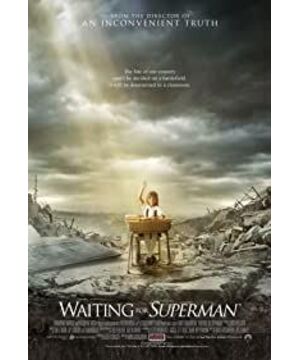Guggenheim looks a bit like a rugged version of Hugh Grant. This is also my first close encounter with a documentary director who is well-known in the United States. As he did last time, he wants to show you the education problems in the United States in a reasonable manner, with a little humor. But from the perspective of writing the paper, he obviously said that some facts are unclear. For example, he said in the Desperate Truth last time how the content of carbon dioxide has increased in the past few years, and then he predicted it, according to this The linear growth rate, how many years later the carbon dioxide content will be, this is obviously a wrong assumption, assuming that the rate increase still satisfies the current linear relationship. This time is the same. For example, students have poor math scores and poor reading scores. Each state gives a ratio, but he didn't clarify what is bad. C is bad or D is bad? When giving grades, it is also proportional to the good and the bad. Without this clear definition of relative comparison and absolute comparison, it would be difficult to convince me of this evaluation of education "failure".
However, Guggenheim is a documentary filmmaker after all. Like his father’s work, he may think it’s more important to tell everyone that there is such a problem. As for whether the problem is rigorously stated, he may not be so. care. In terms of technique, it is a documentary format that Americans love to hear. There are many interviews and real materials. The sensational place is absolutely not soft. The data, icons, or some animated small scenes that Guggenheim likes to use are all simple and easy to understand. Having said that, whether the education problem in the United States can be attributed entirely to the strength of teachers seems to be a bit extreme. In short, judging from the examples of American children around me, it is not necessarily the main cause.
However, it can be seen that some problems of the education system are similar whether in China or in the United States, such as lottery, such as public and private, such as the inequality of educational opportunities. Looking at the past, we can see the problems in the documentary, but You may not see a reasonable solution.
View more about
Waiting for Superman reviews








